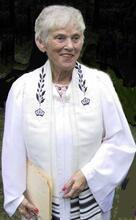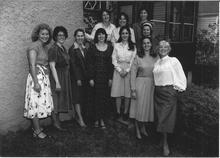Julie Johanna Engel
Born in Burghaslach, Germany, in 1922, Julie Johanna Isner Engel dreamed of becoming a full-time professional opera singer. However, after fleeing the Holocaust and settling in the United States in 1938, that dream proved impossible. She moved to Long Island and honed her vocal talents in community and synagogue choirs and in a local opera company. In the 1970s, she combined these musical skills and became one of the early generation of women cantors in the United States, serving Temple Judea in Howard Beach, New York, until shortly before her death in 1980.
Early Life
Julie Johanna Isner was born on April 12, 1922, in Burghaslach, Germany, a small town of 800 people in northern Bavaria. Her father, Maria Moses (Maro) Isner (1881–1944), had been awarded the Iron Cross for courage in the First World War and owned a shop that sold textiles, china, and imported groceries. He also sold hops from Yugoslavia to local breweries. Her mother, Bella Rosenbacher Isner (1895–1947), was a housewife. The Isner family was musical; Maro played the violin and Bella the piano. Their first child, Justin (1910-1976), played violin, trumpet, and French horn and studied music at a conservatory in Würzburg, developing a strong tenor voice and later becoming a cantor. In this musical environment, Julie dreamed of becoming an opera singer.
In 1933, amid rising antisemitism in Germany, Julie was sent to live with an aunt in Nuremberg, where she attended the Jüdische Volkschule in Fürth, along with future United States Secretary of State Henry Kissinger (1923–2023). In April 1936, she moved to live with different relatives in Themar. In November 1936, her father sold his business and he, Bella, and Julie moved to Bamberg. Her brother Justin emigrated to the United States in 1936, settling in Cincinnati, Ohio. He later joined the Army and fought in the Second World War for the United States, returning to Cincinnati after his military service.
In September of 1938, Julie’s parents sent her to join her brother in Cincinnati, where she worked as a housekeeper for Rabbi Michael Aaronsohn (1896–1976). (In 1923, Aaronsohn had become the first blind rabbi to be ordained by Hebrew Union College, having lost his sight rescuing a wounded comrade in 1918 during the First World War.) In November of 1939, Maro and Bella Isner also emigrated to the United States, arriving in December of that year and settling in Cincinnati.
After her father’s death in 1944, Julie moved to New York with her mother. Several months after her mother’s death in 1947, she married Martin Engel (1920–2013), who had emigrated from Germany to the United States in 1935 at the age of fourteen. He learned hairdressing as a trade and eventually became owner of three salons on Long Island. Together, they had a son, Mark Engel (b. 1950).
Musical Activity
Engel had dreamed of becoming a professional opera singer since she was a child. The rise of the Nazi regime and the Second World War interrupted this dream. Following her marriage to Martin Engel, a full-time career as a professional singer remained out of reach for financial reasons. However, Engel’s love of opera persisted, and she enjoyed singing parts from Lehar’s The Merry Widow, Puccini’s Tosca and Madama Butterfly, and even Verdi’s La Traviata. She pursued vocal training and developed a clear, lyrical soprano singing voice.
Julie Engel sings the “Shema” prayer accompanied on the organ, 1970s. Recording courtesy of Mark Engel.
Engel joined both sacred and secular choirs, singing with the United Choral Society on Long Island under the baton of noted choral conductor David Randolph and with the choir at her synagogue, the Nassau Community Temple in West Hempstead, New York. She also sang in a choir conducted by Jewish liturgical music scholar Abraham Wolf Binder, although the specific choir in which she sang with him is unknown.
In 1964, Engel learned about the Long Island Opera Showcase. Founded in 1958, the opera company began as an adult education class taught by Nino Luciano, a tenor who sang with the New York City Opera. By the time Engel joined, the company staged full shows in towns across Long Island. As part of her performance work with the Long Island Opera Showcase, Engel added acting classes to her voice lessons, allowing her to develop her stage presence as well as her vocal skills. She performed with the company until 1967.
Cantorial Work
With her trained voice and performance skills, Engel quickly became a leading singer in the choir of Nassau Community Temple. In addition to her musical skills, she was proficient in Hebrew and very religious; she cherished memories of attending Friday night services at the synagogue in Burghaslach as a small child with her father and her grandfather. She learned the music for Shabbat services as well as for the High Holiday and festival services, occasionally substituting for the regular cantor when he was unavailable. In 1975, she led the service during the Sisterhood Shabbat. Her substitute cantorial work was so good that, in the early 1970s, some members of the congregation urged her to apply for the job permanently.
In the 1970s, women cantors were rare enough that a woman leading services at a Reform synagogue could still attract the attention of local newspapers. However, they were not entirely unknown. Hebrew Union College accepted three women students into its cantorial investiture program in the early 1970s (Barbara Ostfeld in 1970 and Sheila Cline and Mimi Frishman in 1971), although the school did not guarantee jobs for them upon graduation. Other individual women without institutional training had taken cantorial positions in Reform synagogues. Inspired by the example of Betty Robbins, who had become the cantor of Temple Avodah in Oceanside, New York, in 1955, Engel applied for the job of cantor at the Nassau Community Temple.
Engel’s application caused controversy at her synagogue, as a bylaw prohibited a member of the congregation from taking the position of rabbi or cantor. While a strong group of congregants wanted the synagogue to make an exception to this rule for her, other congregants wanted to uphold it and argued against her application. Not wanting to cause division in her community, she applied for cantorial positions at other synagogues on Long Island, in Brooklyn, and in Queens.
In her application letters, Engel did not disguise the fact that she was a woman; instead, she highlighted her gender as an opportunity for a Reform synagogue to put its politically progressive ideals into action. She wrote,
At a time when the role of women in our society is taking on new shape, many religious groups find it advisable to open their doors to this progressive trend. Your congregation may perhaps welcome a new and stimulating experience such as being, on occasion, led in its prayers by a Cantoress, instead of a Cantor. Such an innovation would convey a spirit of open-mindedness which, combined with the adherence to good old Jewish tradition, might even attract new members to the congregation and, in any event, enhance the human impact of your services.
This argument persuaded the hiring committee of Temple Judea in Howard Beach, which hired her as its full-time cantor in 1977. She held this position for three years, until just before her death.
During her tenure as cantor at Temple Judea, Engel trained the synagogue choir, officiated at Shabbat, High Holiday, and festival services and bar and bat mitzvahs, and performed at a benefit concert for the synagogue.
Julie Engel leads a congregation in an English translation of “Va’anachnu,” accompanied on the organ, 1970s. Recording courtesy of Mark Engel.
Julie Engel leads a congregation in the “Barechu,” accompanied on the organ, 1970s. Recording courtesy of Mark Engel.
She also attended a reunion of former students of the Jüdische Volkschule in Fürth, held at Grossinger’s Catskill Resort Hotel in 1978. At the reunion, she led a musical program that featured both German songs and contemporary American popular repertoire.
End of Life
Engel’s cantorial career was cut short by a diagnosis in January 1979 of multiple myeloma, a cancer of the plasma cells. A few months later, she worked with comedian Sam Levinson and her physician Dr. Kanti Rai to establish the Hanna Engel Myeloma Medical Research Fund at Long Island Jewish Hospital. Engel died of multiple myeloma on April 10, 1980, two days before her 58th birthday. She was buried on April 13, 1980, on the eve of Yom HaShoah.
Acknowledgements
Many thanks to Mark Engel for sharing his family’s history and archival materials, and to Judith Pinnolis for essential background research.
Photographs, recordings, news clippings, general biography graciously provided from the family collection of Mark Engel.
Appell, Wolfgang. “Juden in Erlangen Band II (I - L) Militärdienst – Erster Weltkrieg.” Self-published, Erlangen, Germany, 2020. (Viewed on February 14, 2024) http://www.lorlebergplatz.de/juden_in_erlangen_II_I-L.pdf.
Heskes, Irene and Judith S. Pinnolis. "Cantors: American Jewish Women." Shalvi/Hyman Encyclopedia of Jewish Women. 23 June 2021. Jewish Women's Archive. (Viewed on February 14, 2024) http://jwa.org/encyclopedia/article/cantors-american-jewish-women
Fishman, Sylvia Barack. “Women’s Transformations of Contemporary Jewish Life.” In Women and Judaism: New Insights and Scholarship, edited by Frederick E. Greenspahn, 182-198. New York: New York University Press, 2009.
Geller, Laura. “From Equality to Transformation: The Challenge of Women’s Rabbinic Leadership.” In Gender and Judaism: The Transformation of Tradition, edited by T. M. Rudavsky, 243-253. New York: New York University Press, 1995.
Nuernberg-Fuerth Reunion Collection. “Reunion Programs, 1978 – 2005.” Collection held at the Center for Jewish History, New York, NY. Box 1, Folder 3 (AR-6654). Digitized. (Viewed on February 14, 2024). https://digipres.cjh.org/delivery/DeliveryManagerServlet?dps_pid=IE1336886.
Ostfeld, Cantor Barbara. “The Ascent of the Woman Cantor: Shir Hamaalot.” In New Jewish Feminism: Probing The Past, Forging The Future, edited by Rabbi Elyse Goldstein, 133-143. Woodstock, VT: Jewish Lights Publishing, 2009.








